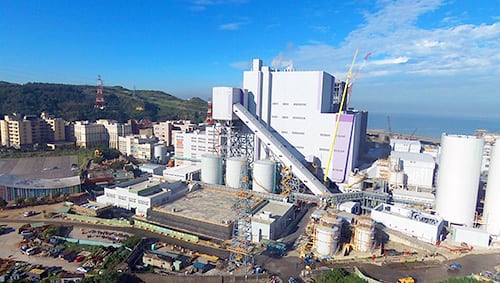Tests of a boiler combustion tuning system employing artificial intelligence (AI) at a Taiwanese coal-fired power unit verify improvements to fuel economy that could ultimately reduce costs by up to $1 million annually, Mitsubishi Hitachi Power Systems (MHPS) announced on June 11.
Verification testing of the AI-enabled combustion tuning system was conducted at Unit 2 of Linkou Thermal Power Plant, a three-unit plant owned by Taiwan Power Co. Units 1 and 2, which went online in October 2016 and March 2017, and Unit 3, which will come online in 2019, are high-efficiency 600C-class coal-fired ultra-supercritical pressure units, each about 800 MW. The boilers in use at the units are once-through radiant reheat type boilers.

Linkou Thermal Power Plant is a three-unit plant owned by Taiwan Power Co. Units 1 and 2, went online in October 2016 and March 2017, and Unit 3, will come online in 2019. Courtesy: MHPS
MHPS–which designed, manufactured, and supplied mechanical equipment for the units, including the turbine and boiler– began trial operation of the automatic boiler combustion tuning functionality at Unit 2 in March last year, just before the unit began operation. The system "takes into account economic aspects such as boiler efficiency and auxiliary power, in order to enhance the combustion tuning with the aim of optimizing several process values," MHPS said.
Combustion tuning testing is conventionally conducted by experienced engineers, who adjust the various parameters set during the program run-time, such as flue-gas emission characteristics, combustion balance, steam temperature characteristics, and boiler efficiency, in order to optimize the process, MHPS explained. By incorporating AI in the combustion tuning test, the company essentially created a machine-learning model that analyzed changes in operating parameters and boiler operating conditions–and could suggest the best operation setting parameters that would achieve a balanced boiler operation.
"By taking time from the start of operations for the Linkou Thermal Power Plant's No. 2 boiler to become thoroughly familiar with its operation, and learn the characteristics of the boiler, the system was able to achieve combustion tuning functionality to handle a range of coal types," MHPS said. The AI system was furnished with "information on additional changes to process values related to economic aspects such as boiler efficiency and auxiliary power, and was used to propose the optimal parameters. As a result, the AI's suggested parameters led to further improvements in economic efficiency," it said.
MHPS said that the combustion tuning system is a core component of a comprehensive system, MHPS-TOMONI, that the company is developing to eventually enable AI-controlled operation of thermal power plants. The MHPS-TOMONI digital solutions service comprises three elements: operations and maintenance, performance enhancement, and operability improvement.
It will help the company "streamline operational and maintenance costs through digital analysis of the large volume of complex data on boiler operations," it said. It will also provide power companies in Japan and around the world with tools for indicating incompatibility and timely detection of anomalies, it added.
–Sonal Patel is a POWER associate editor (@sonalcpatel, @POWERmagazine)
